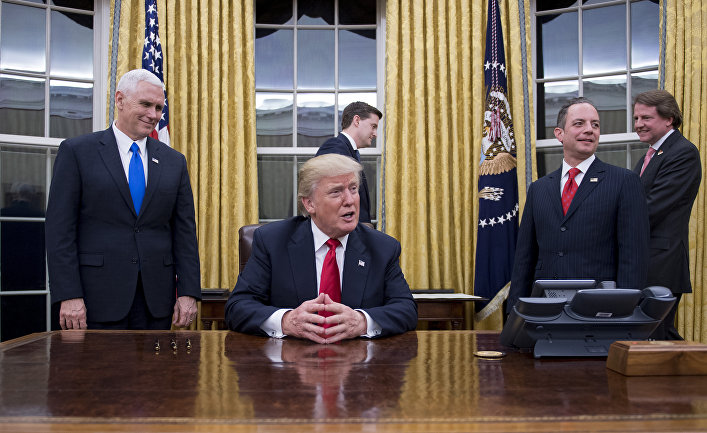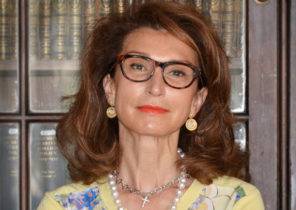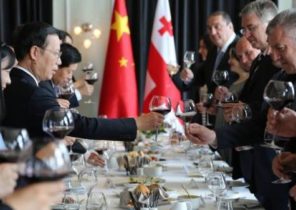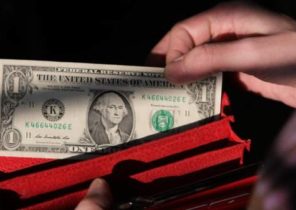
The inauguration of Donald trump on January 20 it became a perfect illustration of the scale of the phenomenon, which can set the tone for international policy in the coming years: we are talking about the rise of strong leaders. This concept is used in a rather broad sense to describe candidates with authoritarian tendencies, who hold tight to the order and security, tend to weaken state institutions and to concentrate powers in the hands of the Executive power. They tend to reject pluralism, that is, the idea of distribution of political power among several, both governmental and non-governmental forces. Instead, they often proclaim themselves the only representatives of “the people”.
Recep Tayyip Erdogan in Turkey, Vladimir Putin of Russia, Nicolas Maduro in Venezuela — all these are classic examples of strong leaders. They without much thought, arrange the detention of the opposition, criticizing them for their lack of patriotism and accusing them of serving “foreign interests”. These policies are carefully maintained existence of a moral form of antipluralism. They feed on the polarization of power: after the election of the three above-mentioned leader of the opposition declared illegitimate and immoral, and called its members “enemies of the people”. Maduro has even said that those who voted against it, traitors.
Does not this remind you of one of the newly elected in America politics? Hint: in the November 2016 Donald trump talked about “millions of illegal voters” when he tried to justify the defeat, in terms of the absolute number of votes cast for him. Of course, not all strong leaders are equally authoritarian, and rigid institutional framework may limit their field of activity. Took whether trump place in the club of authoritarian populists near Putin and Erdogan? We’ll find out.
A year of challenges for democracy
Thus, 2017 will be the year of the power of strong leaders in Washington, Budapest, Moscow, Manila and Caracas. What is this unprecedented in modern history, the situation in the international political arena? First of all, it symbolizes the deep crisis of diplomacy with a real danger of proliferation. In the case of the most radical manifestation, as in Venezuela and Russia, the holding of free elections even more is not necessary, because the President already knows what one really wants “the people”.
Anyway, strong leaders can be very competitive in electoral terms, if the voters get the feeling that traditional policies do not meet their expectations, as it was in the Philippines. Populism at the polls, as in the case of Breccia and trump was not a small and inconspicuous countries, and two of the oldest and most experienced of modern democracies. They played a key role in democracies around the world, despite the many pitfalls.
One of the consequences of approval of populism in the White house will be the decline of US influence. Besides, the election trump already had a negative impact on soft power of America. The United States is becoming less attractive, and they are more difficult to engage in cooperation (and not to impose their will by force), which is a blow to the legitimacy of democratic power in the rest of the world. This trend emerges even stronger if trump persists in some of the made during the campaign promises, in particular the plans of discrimination against persons of the Muslim faith.
The Offensive Trump
With the increasing development and Islamophobic movements and trends in Western democracies, the US and other countries will totally undermine the legitimacy of its criticism of the governments of China, Burma and other States in their approach to religious minorities. It is likely that the trump of the United States will reduce spending on support for various groups in the protection of human rights and democracy.
Although criticism of American policy on many issues is actually justified, it is impossible not to recognize the huge investment of Washington (almost $ 10 billion a year for the past decade) to help NGOs, journalists and opposition groups in dictatorial regimes around the world.
Trump openly stated that is not interested in protecting or promoting democracy abroad, and even touted the positive qualities of strong leaders such as Vladimir Putin, Viktor Orban and Rodrigo Duterte.
The disappearance of truth, pluralism and stability
The arrival of strong leaders to power around the world coincided with the era of post-truth. This trend is becoming a threat to the main advantages of democracies to authoritarian regimes: the use of accessible and transparent data for the formation of public policy and honest debate for the election of informed and competent leadership. Democracy is noisy, but relatively mild and guarantee a certain stability.
Spreading false information is also becoming a new challenge for democracies. The press, which is struggling to adapt to the digital age, there is no funding for investigative journalism, particularly at the local level. Meanwhile, the social network and the media contribute to the fragmentation of society. Today a significant part of the society to broadcast only a few concentrated sources of information.
The result is an atmosphere full of distrust, has been a godsend for strong leaders of the era of post-truth like trump and Putin. In addition, democracy, accept diversity and globalization, become preachers of the integration of migrants from around the world. In most Western democracies, the number of overseas-born citizens in recent years consistently equal to 10% of the population, and in Canada and Australia this figure reaches 20%.
Approach to leadership
Approach strong leaders to lead the country relies on separation and fear trump and Putin without end pushing on the danger from strangers and abroad, whether Mexicans in the United States or funded from abroad NGOs in Russia. Most observers now expect that the US will come from bilateral trade agreements and even military and defense alliances that would further limit the U.S. role in the international arena.
It is now believed that democracies create greater instability in the economy than authoritarian regimes. Just a few years ago this was unthinkable. In addition, given that the polls failed to predict Brakcet and victory trump, the volatility of markets increases with each election. And that’s bad news: investors need first and foremost stability and reliable predictions. 2017 may be the year of not only strong leaders, but also of great economic instability, with disastrous consequences. If this trend in democracies is steadily secured, it can jeopardize the very essence of democratic leadership with a moral, strategic and economic points of view.
Trump and Putin — the happy couple?
As stated by trump during the October debates, he does not know Putin. But even if they become friends, it does not guarantee stable relations between the two countries. The idea that personal friendship of the two strong leaders leads to a strong Alliance, is fundamentally wrong. Everything rests on their ability to negotiate international agreements that differ more regularity.
Erdogan was so close to Bashar al-Assad that their families were together on vacation. But this did not prevent them to quarrel and to produce the acute hostility in the middle East. Now it seems that Russia may take advantage of the change of the political atmosphere in the United States. Trump, in turn, flatteringly about his Russian counterpart and almost did not mention the Kremlin’s meddling in American elections.
However, one can quickly throw another. All politicians generally know how to separate feelings from decisions, and trump and Putin, a vain and hard people are unlikely to be inclined to make concessions and compromises if it would threaten their ego. This unprecedented uncertainty does not Bode well for economic growth. At the same time, the presence of strong leaders in Washington and Moscow becomes an unambiguous signal for populists around the world.
Presidential elections in France, where marine Le Pen was expected to Express themselves, whether or not in 2017 in France will be a year of strong leaders. Its victory would mean the end of the European Union. The French and Germans are preparing to make their choice, and the stakes have never been higher.







